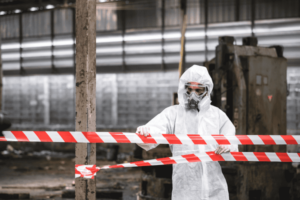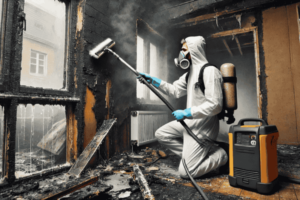A house fire is one of the most feared catastrophes that can befall a family. Fires can be fatal and destroy precious belongings every year (like this one). However, there are some preventative measures you can take that will help reduce the risk of a fire in your home.
It’s impossible to know when a house fire will occur, but they are much more common in colder months. The Red Cross states that the number of home fires increases in fall and winter, with the most in December and January. They occur more often on weekends, especially between 6pm and 7pm.
1. Smoke Alarms
Smoke alarms are meant to act as an early warning system for fires. Batteries in smoke alarms should be tested monthly and replaced at least once a year. Setting up calendar reminders to check and replace the batteries will help keep them in working order when you need them most.
2. Heating Sources
Regular maintenance of your heating sources is essential to guard against house fires. If the gas or electric heater is not operating correctly, it can lead to the start of a house fire. The ductwork of a heater can collect dust that can easily spark a flame.
Portable space heaters can also present dangers, they cause more house fires than central heating every year. Make sure you have adequate ventilation whenever you’re using a space heater. The heater should be kept at least three feet from furniture, drapes, and other flammable materials. Consider using a model with an automatic shut-off feature to help prevent overheating.
3. Cooking Areas
It doesn’t take long for a small stovetop flame to turn into a dangerous fire that can devastate your house. Never walk away from your stove when it’s on. Thorough cleaning of the cooking area will remove food particles from the burner that can catch on fire when heated.
Dish towels, oven mitts, cookbooks, food packing materials, and even low-hanging curtains can easily catch fire if left on or near open flames or extreme heat.
Outdoor grills and fire pits pose additional dangers. Grills need to be placed far enough from the house and away from trees, bushes, deck railings, and other areas that can catch fire from an errant spark or excessive heat.
More on avoiding fire damage from cooking >>>
4. Clothes Dryers
Clothes dryers are large appliances that generate a lot of heat. Regular inspection and maintenance calls will help to keep the dryer working in the most efficient and safest condition. The lint trap needs to be cleaned out before each use.
Depending on how your dryer system is set up, make sure to clean out the ductwork and filters that hold in dirt, dust, and fabric at least a few times per year. Collected dust can get dry and brittle, making it highly combustible.
5. Electrical Cords
We are more connected to multiple devices needing power than ever before. Most modern homes have an elaborate system of power strips and extension cords that hold the cables for phones, tablets, computers, and other products of the digital age. Power strips with power surge protectors will help to reduce the risks of overloading your power supplies.
Frayed cords and cables on your home’s other appliances also pose a fire danger if left unattended. Replace faulty or frayed wires and keep all wires and cords away from furniture and other potentially combustible materials.
6. Flammables
Store flammable liquids outside, away from the house. Common products like hairspray can be combustible if exposed to an excessive heat source. Keep these things stored away from space heaters in a cool, dry space.
7. Candles
Winter is a nice time to light a candle to create a mood with a pleasant scent. Unfortunately, you’re running the risk of starting a fire if you leave that candle alone. Keep them away from things like blankets, scarves, and other flammable materials.
Never leave candles unattended by going to sleep when they’re still burning. If you start feeling tired, slap yourself in the face, get up, and blow out those candles. Your future self will be very grateful.
Check this out to get even more in-depth on the hidden dangers of candle fires >>>
8. Fireplaces
We all love to curl up in front of a fireplace on a cold Winter night. To stay safe while enjoying the warmth, make sure there is a screen protector to prevent sparks from jumping out. Make sure you clean your chimney at least once a year.
9. Fire Extinguishers
Use a fire extinguisher if the fire can’t be put out by baking soda or smothering. It’s important to keep at least one in your home and to make sure everyone knows how to use it.
10. Cigarettes
Cigarette smoking remains one of the leading causes of home fire deaths. Keeping all smoking outside, or not smoking at all, will go a long way to prevent house fires. Before throwing butts in the trash, douse them in water to make sure they are fully out.
Preventing House Fires Saves Lives
Other than being extremely dangerous, a house fire can end up costing you a lot (like this residential one, or this commercial one).
Following these useful tips to prevent house fires can save lives, your belongings, and your property. If you have suffered damage from a house fire, contact a fire restoration professional to get your home and your life back together.







